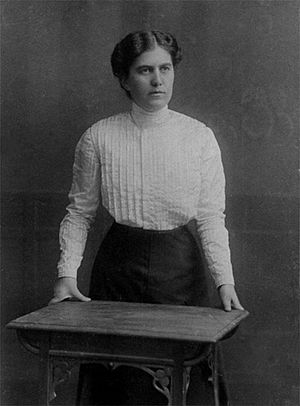Dimitrana Ivanova facts for kids
Dimitrana Ivanova, born Petrova (Bulgarian: Димитрана Иванова, 1881–1960), was an important Bulgarian woman. She worked to improve education and fought for women's rights. She was also a suffragist, meaning she supported women's right to vote. From 1926 to 1944, she led the Bulgarian Women's Union.
Biography
Dimitrana Ivanova was born on February 1, 1881, in Rousse, Bulgaria. Her father was a trader. She went to local schools for girls. In Bulgaria, women could listen to lectures at the University of Sofia from 1896. However, they could not be regular students until 1901. Even then, it was hard for girls to get into university. Girls' high schools only taught six of the seven grades needed.
Dimitrana Ivanova wanted to study law in Sofia but was not allowed. Instead, she became the first woman to study education and philosophy. She studied at the University of Zürich in Switzerland. When she came back to Bulgaria in 1900, she became a teacher. This was almost the only job women could have. For a while, married women were not allowed to teach.
In 1914, she married Doncho Ivanov, who was also a teacher. She kept working because the rule against married women teaching had changed. In 1921, she tried again to study law at the University of Sofia. She was finally allowed to study and graduated in 1927.
Women's Right to Vote
In 1926, Dimitrana Ivanova became the leader of the Bulgarian Women's Union. This group worked for women's rights and was started in 1901. She took over from Julia Malinova. From 1935 to 1940, she was also on the board of the International Alliance of Women.
Dimitrana Ivanova became very well-known. People often talked about her in public. She was sometimes shown in funny drawings in newspapers. As the leader, she focused on two main things. First, she wanted women to be allowed to work as lawyers. This was important because it would show that women could do other similar jobs too. Second, she fought for women's right to vote.
Bulgarian women gained a limited right to vote in 1937. However, they could not run for election themselves if they were widowed, married, or divorced. After a big change in government in Bulgaria in 1944, many groups like hers were stopped. Dimitrana Ivanova was briefly held. But she was released in 1945 with help from friends.
See also
 In Spanish: Dimitrana Ivanova para niños
In Spanish: Dimitrana Ivanova para niños


